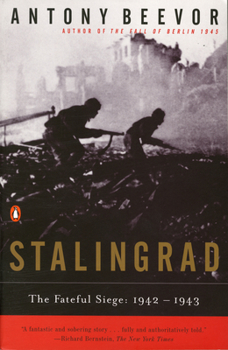Stalingrad
Select Format
Select Condition 
Book Overview
The Battle of Stalingrad was not only the psychological turning point of World War II: it also changed the face of modern warfare. From Antony Beevor, the internationally bestselling author of D-Day and The Battle of Arnhem. In August 1942, Hitler's huge Sixth Army reached the city that bore Stalin's name. In the five-month siege that followed, the Russians fought to hold Stalingrad at any cost; then, in an astonishing reversal, encircled and trapped...
Format:Paperback
Language:English
ISBN:0140284583
ISBN13:9780140284584
Release Date:May 1999
Publisher:Penguin Books
Length:528 Pages
Weight:1.12 lbs.
Dimensions:1.1" x 5.4" x 8.8"
Age Range:18 years and up
Grade Range:Postsecondary and higher
Customer Reviews
4 ratings
Excellent work
Published by Thriftbooks.com User , 7 years ago
I have come to WWII late in life and find myself devouring books on the subject. Antony Beevor's work should be the standard by which all others are judged. Not only do you get the viewpoint of the politicians and generals but Beevor puts in in the trenches with the men who fight, and suffer in war. If you like reading about WWII I highly recommend you read all of Beevor's works. I would give 10 Stars if it were possible!!
Beevor shows the unbelievable human suffering of war.
Published by Thriftbooks.com User , 19 years ago
Beevor gives the big picture view of the Battle of Stalingrad. I have read many books of World War II battles, and this is the first that really described the tragedy of what common soldiers go through. It also gave a good look at the Russian and German armies and their commanders. Beevor gives a big picture view of the battle by showing the policies of Stalin and decisions by the generals, but also brings his focus on what the soldiers were going through. Beevor also gives us a look at the brutality of Stalin and Hitler. My only problem is that it would have been nice to have more situation maps detailing the events (military unit maneuvers) in the book. Other than that it is an excellent read.
One of the four best works on Stalingrad ever written
Published by Thriftbooks.com User , 20 years ago
This book by noted writer Antony Beevor joins three others that are essential English language "classics" on Stalingrad. These important books are John Erickson's "The Road to Stalingrad: Stalin's War with Germany" and Joel Hayward's "Stopped at Stalingrad: The Luftwaffe and Hitler's Defeat in the East 1942-1943" and Earl Ziemke and Magna Bauer's "Moscow to Stalingrad: Decision in the East".Beevor has used all three and produced a work that is the least academic but arguably most exciting of all. He has also used Manfred Kehrig's "Stalingrad: Analyse und Dokumentation einer Schlacht"which is not available in English --- sadly.Beevor also uses the latest research on the Soviets, including the books by David Glantz. He paid researchers to translate unpublished Soviet documents, which also enrich his text.The book is clearly an excellent overview of the efforts put into winning at Stalingrad by both sides. As scholars have noted in learned articles, Beevor ignores airpower and only deals sketchily with strategy, but his narrative of the human experience of warfare is more than compensatory.
Concise history of the great campaign and its aftermath
Published by Thriftbooks.com User , 25 years ago
Having read many works concerning Stalingrad, I suspect that we may be approaching the point where a definitive, detailed, multi-volume history of the great battle could be possible. Indeed, this should probably be attempted before the surviving veterans all pass on. That being said, this is a very acceptable single volume account of the Stalingrad campaign. It compares favorably with Craig's work, _Enemy at the Gates_.One of the strengths of Beevor's work is his view of the Russian side of the struggle. This is attained through access to now available Soviet archives. It is also attained through the greater willingness of Russian veterans to speak of their experiences without the distorting rhetoric often associated with The Great Patriotic War. The candid discussion of desertion and outright collaboration on the part of some Russian soldiers forms one of the most interesting aspects of this book. Likewise, the fate of approximately 85,000 German soldiers who entered Soviet captivity never to return is treated with even greater detail than that revealed by Craig. Again, I suspect that Beevor enjoyed access to records-- and candor-- that Craig and earlier writers did not.While I do not completely agree with all of Beevor's conclusions, he makes a convincing case for the primary responsibility of Paulus for the destruction of the Sixth Army through failure to maintain an uncommitted panzer reserve in the late fall of 1942. This failure on the part of a commander is too often ignored in works which blame the destruction of the Sixth Army on Hitler's "stand fast" order and von Manstein's failure to send a "breakout" order.Students of the campaign should add this volume to their library.






